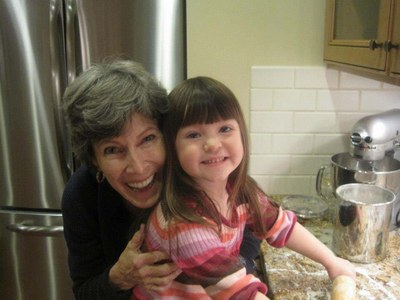Adore your Adult-child
Adore the Adult Who is Raising Your Grandchild
by Jan Faull


A mom approached me, frustrated with her own mom, who frequently questions her approach to parenting: "When in the world are you going to potty train that child?" "You give her too many choices." "Don't you ever tell that child 'No!' and mean it?" "It takes you forever to put that child to bed, why all the singing, massaging and story-reading?"
The young mother consequently prefers not to be around her mother.
Why would she, when she only feels criticized, questioned, challenged and judged by her?
No grandparent wants to be kept from a grandchild's life. Yet some grandparents find themselves in this position because their need to parent their adult child overrides the importance of a relationship with their grandchild.
Following the rules of gracious grandparenting will help. What are the rules? Let's let common sense dictate them:
Rule No. 1
Resist offering unsolicited advice. The most you can say is, "Here's what worked for me. ... " "It's so different today from when I raised you." "What does your doctor recommend?"
It's such a joy to witness a grandchild run with sheer joy into the arms of Grandma or Grandpa. How does a grandparent reach this point in their relationship with their grandchild?
By taking the grandchild aside and reading a story, offering a small gift — puzzle, paint or game — and playing with it with the child. By playing hide-and-seek or peek-a-boo, playing imaginatively with dolls or trucks or cooking together. By going to the library, a puppet show or park together without the mom or dad.
Rule No. 2
Have fun — carve out a unique spot in your grandchild's life that is between the two of you alone.
Behind every child there needs to be a parent who absolutely adores her. And behind every parent there needs to be a person who communicates to that parent that he is doing a wonderful job. When Grandma and Grandpa share in the adoration of this child, the parent who's doing the tough work of parenting feels nurtured which in turn provides energy to raise, guide, feed, cuddle, settle and positively interact with the child.
Rule No. 3
Adore your adult-child who is raising your grandchild. All — including the grandparents — will benefit.
One mom had unreasonable expectations and an inappropriate approach to teaching her preschool-age-child table manners. The mom would criticize any little error the child made. The child would squirm as she tried to do what was expected but then looked confused, frustrated and embarrassed, only to slip up again.
The dinner-time sequence occurred even when Grandma and Grandpa were dinner guests. The hearts of the grandparents went out to their granddaughter. What's a grandparent to do?
Grandma, while doing the dishes with her daughter, said kindly, "It's so hard to watch you criticize little Amy's table manners. It makes your dad and me so uncomfortable." The mom changed her ways.
Rule No. 4
When a grandparent needs to offer feedback, do so with a brief statement and communicate how the parent-child interaction affects you. Offer your opinion in a sound bite; then let the parent do with it as she sees fit.
Last, when you're at a loss, err on the side of love. Zip your lip if you fear that consternation will slip out, and unzip it to offer a compliment or a word of reassurance. Then, open your arms to the child and parents while asking, "Is there anything I can do to help?"
About Jan Faull
 Jan Faull, M.Ed., has taught Parent Education for more than twenty-seven years. Jan's weekly column Parenting for The Seattle Times ran for ten years.
Jan Faull, M.Ed., has taught Parent Education for more than twenty-seven years. Jan's weekly column Parenting for The Seattle Times ran for ten years.
She is a recognized speaker to a wide variety of local and national organizations. Jan is the author of five books: Mommy, I Have to Go Potty (Raefield & Roberts, 1996); Unplugging Parent-Child Power Struggles: Resolving Emotional Battles with Your Kids Ages 2-10 (Parenting Press, 2000); Darn Good Advice-Parenting (Barrons, 2005); and Darn Good Advice-Baby (Barrons, 2005). Her latest book: Amazing Minds: The Science of Nurturing Your Child's Developing Mind was published in August 2010 by Berkley Books a subsidiary of Penguin.
Jan was a board member for PEPS (Program for Early Parent Support) and currently serves on the PEPS Emeritus Board. The mother of three adults and grandmother to three granddaughters, Emilia, Flora and Violet, she resides in Seattle.
- Sign up for our Grandparent newsletter, featuring topics relevant to grandparents
- Join our PEPS Grandparent Facebook Group
Document Actions